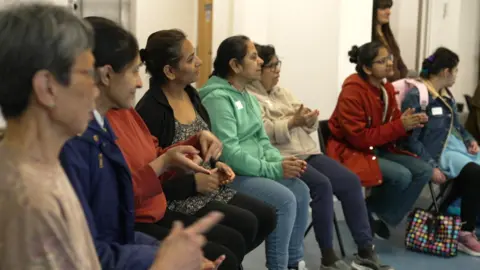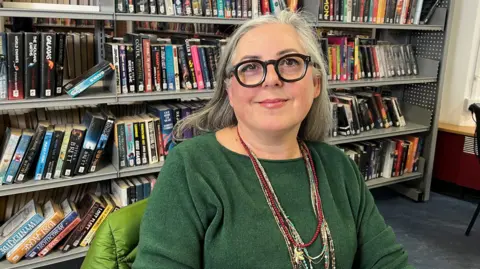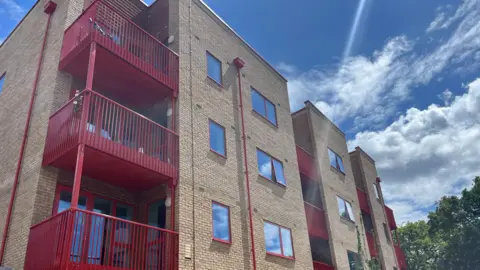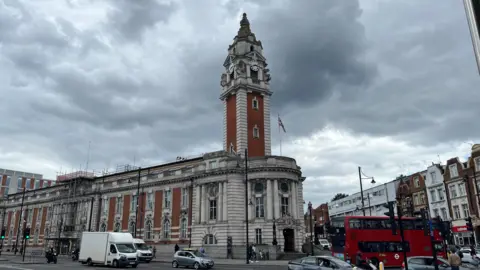Why London councils want more Spending Review cash
 BBC
BBCAt Chipping Barnet library, elderly and vulnerable adults meet for a weekly singalong run by the Alzheimer's Society, which receives funding from Barnet Council.
For Hing Chan it helps keep her mind active. She said: "When we're not housebound we like to get out and about. This programme is for dementia, but I feel I benefit from it too."
Barnet Council's spending on care packages for vulnerable adults has risen by 58% (£68m) in five years. It is calling for more support from government in the Spending Review on 11 June.
A government spokesperson said they had "inherited a broken housing crisis and social care system" and were "taking decisive action to fix both".

Listening to the singers in action, Barnet Council leader Barry Rawlings told me the government needed to allocate more funding for councils to enable them to focus on prevention.
He said: "Helping people have work, be independent, live in their own homes, hopefully, will save money, but you need to have that ability to invest in prevention.
"At the moment all the money is going on crisis intervention rather than on preventative work, so I'm hoping that the Spending Review will give us a bit of leeway."

Increasing demand for adult social care is just one of the huge financial pressures that London boroughs including Barnet are facing.
Children's social care and the cost of providing temporary accommodation to homeless residents are all pushing boroughs across the capital to the edge, according to London Councils, which is the umbrella group that represents London's local authorities.
It warned that they collectively faced a deficit of £500m this year.

Barnet is one of seven London boroughs, along with Croydon, Enfield, Haringey, Havering, Newham and Lambeth, to have asked the government earlier this year for exceptional financial support (EFS) - where they can borrow more money - and they have done that to the tune of more than £400m collectively.
Just outside London, the local authorities of Slough, Thurrock, Windsor and Maidenhead, and Woking have also been give EFS this year.
Barnet secured £55.7m of EFS but it still must find savings of £23m for this financial year.

One of the areas impacted is its library service, which Barnet has promised to keep open. However it is reducing opening hours at four libraries, including Chipping Barnet, to save money.
Lola Stanley, who is a regular visitor to Chipping Barnet Library, said she wanted to see more government funding for councils, so that Barnet would not have to shorten opening hours which she thought were "already short as it is".
She said: "Some people don't have enough money and they come here to read the paper, borrow the books or... they need a place to be because their homes are very little... I don't think it's a good idea to cut any more expenditure."

Elsewhere, Barnet Council is focusing on is on building more council housing to reduce its waiting lists and the financial burden of providing temporary accommodation.
Twenty eight flats have been completed on the Broadfields Estate in Edgware as part of the council's pledge to build 1,000 new council homes by next year.
However it just scratches the surface of the housing need, with 2,886 households in temporary accommodation in the borough.
Across the capital one in 50 Londoners is living in temporary accommodation, costing local authorities £4m a day collectively, London Councils said.
'Funding crisis'
The chair of London Councils, Claire Holland, also leads Lambeth Council. The borough received £40m in EFS because of the financial pressure on its Housing Revenue Account.
Ms Holland warned that London boroughs needed "as much money as the government can afford" in the Spending Review to prevent a "crisis" in local government finances.
She told me she had three asks from this spending review: "One, emergency funding to address immediate pressures primarily in temporary accommodation and homelessness, but we also have pressures in adults and children's social care.
"Two, we need investment in housing and infrastructure so more money in the affordable homes programme.
"And three, we need funding so that we can invest in prevention."

A spokesperson for the Ministry for Housing, Communities and Local Government said: "We're providing the largest-ever cash boost in homeless prevention services to stop people becoming homeless in the first place and provide them with safe, secure, and accessible housing.
"While to help deliver better social care service, we are supporting local authorities with up to £3.7bn."
Listen to the best of BBC Radio London on Sounds and follow BBC London on Facebook, X and Instagram. Send your story ideas to [email protected]
